
The plumed whistling duck, also called the grass whistling duck, is a whistling duck that breeds in Australia. It is a predominantly brown-coloured duck with a long neck and characteristic plumes arising from its flanks. The sexes are similar in appearance.
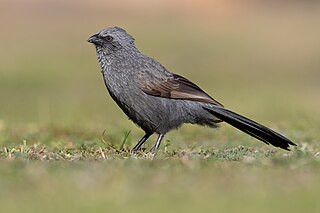
The apostlebird, also known as the grey jumper, lousy jack or happy family, is a quick-moving, gray or black bird about 33 cm (13 in) long. It is a native to Australia where it roams woodlands, eating insects and seeds at, or near, ground level. Apostlebirds often travel in groups of about 12; for this reason, they were named after the 12 Biblical apostles.

The eastern spinebill is a species of honeyeater found in south-eastern Australia in forest and woodland areas, as well as gardens in urban areas of Canberra, Sydney, Melbourne, Adelaide and Hobart. It is around 15 cm long, and has a distinctive black, white and chestnut plumage, a red eye, and a long downcurved bill.

The little black cormorant is a member of the cormorant family of seabirds. It is common in smaller rivers and lakes throughout most areas of Australia and northern New Zealand, where it is known as the little black shag. It is around sixty centimetres long, and is all black with blue-green eyes.
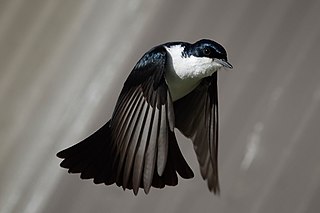
The restless flycatcher or restless myiagra is a passerine bird in the family Monarchidae; it is also known as the razor grinder or scissors grinder because of its distinctive call. It is a native of eastern and southern Australia. Populations in New Guinea and northern Australia, which were at one time considered to be a subspecies, are now accepted as a separate species, the paperbark flycatcher. It is a small to medium-sized bird and has similar colouring to the willie wagtail.

The noisy friarbird is a passerine bird of the honeyeater family Meliphagidae native to southern New Guinea and eastern Australia. It is one of several species known as friarbirds whose heads are bare of feathers. It is brown-grey in colour, with a prominent knob on its bare black-skinned head. It feeds on insects and nectar.

The white-browed scrubwren is a passerine bird found on the New England Tablelands and coastal areas of Australia. Placed in the family Pardalotidae in the Sibley-Ahlquist taxonomy, this has met with opposition and indeed is now known to be wrong; they rather belong to the independent family Acanthizidae.

The yellow-tufted honeyeater is a passerine bird found in the south-east ranges of Australia. A predominantly black and yellow honeyeater, it is split into four subspecies.

The red-necked avocet also known as the Australian avocet, cobbler, cobbler's awl, and painted lady, is a wader of the family Recurvirostridae that is endemic to Australia and is fairly common and widespread throughout, except for the north and north east coastal areas of the country. Closely related to the stilts, it shares their fragile slender elegance, however the deep red head and neck distinguish them. It appeared on a 13 cent postage stamp in 1966.

The olive whistler or olivaceous whistler, is a species of bird in the family Pachycephalidae, the whistlers, that is native to southeastern Australia.

The black-throated whipbird is a passerine bird found in several scattered populations in Southwest Australia. It is predominantly olive green in colour. It was formerly considered to be conspecific with the white-bellied whipbird, so shares the common name "western whipbird".

The forest kingfisher, also known as Macleay's or the blue kingfisher, is a species of kingfisher in the subfamily Halcyoninae, also known as tree kingfishers. It is a predominantly blue and white bird. It is found in Indonesia, New Guinea and coastal eastern and Northern Australia. Like many other kingfishers, it hunts invertebrates, small frogs, and lizards.
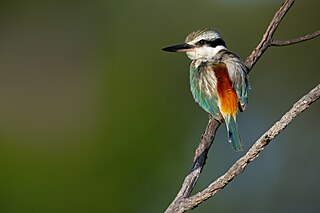
The red-backed kingfisher is a species of kingfisher in the subfamily Halcyoninae, also known as tree kingfishers. It is a predominantly blue-green and white bird with a chestnut rump. It is found across the continent of Australia, mainly inhabiting the drier regions.

The banded whiteface is a species of bird in the family Acanthizidae. It is endemic to dryer regions of Australia.

The black-backed butcherbird is a species of bird in the family Artamidae. It is found in southern New Guinea and Cape York Peninsula in Queensland, Australia.
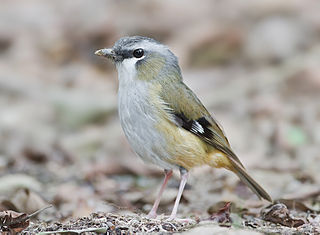
The grey-headed robin is a species of bird in the family Petroicidae. It is found in northeastern Cape York Peninsula, Queensland, Australia.

The pink robin is a small passerine bird native to southeastern Australia. Its natural habitats are cool temperate forests of far southeastern Australia. Like many brightly coloured robins of the family Petroicidae, it is sexually dimorphic. Measuring 13.5 cm (5.3 in) in length, the robin has a small, thin, black bill, and dark brown eyes and legs. The male has a distinctive white forehead spot and pink breast, with grey-black upperparts, wings and tail. The belly is white. The female has grey-brown plumage. The position of the pink robin and its Australian relatives on the passerine family tree is unclear; the Petroicidae are not closely related to either the European or American robins, but appear to be an early offshoot of the Passerida group of songbirds.
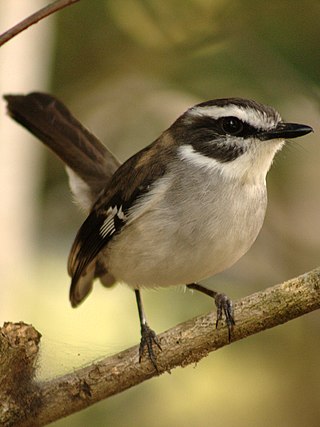
The white-browed robin is a species of bird in the family Petroicidae. It is endemic to north-eastern Australia. Its natural habitats are forest, woodland and scrub, often near water. It formerly included the buff-sided robin as a subspecies.

The frill-necked monarch is a species of songbird in the family Monarchidae. It is endemic to the rainforests of the northern Cape York Peninsula in Australia.
Gordon Ridley Beruldsen was an Australian ornithologist and an expert on the nests and eggs of Australian birds. Beruldsen died in Brisbane, Queensland, after four years of illness with amyloidosis. He was survived by his wife Erina as well as several children, grandchildren and great-grandchildren.



















